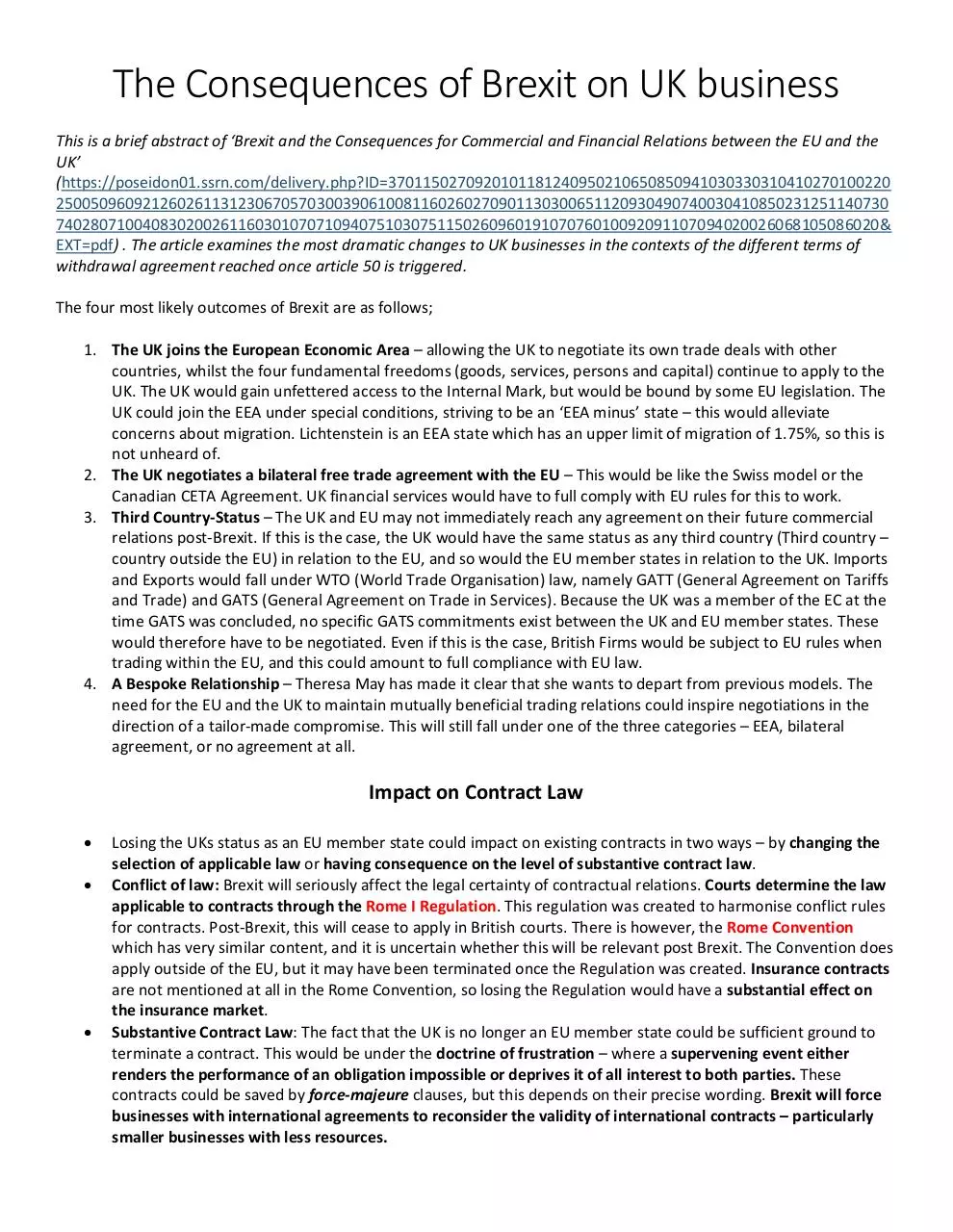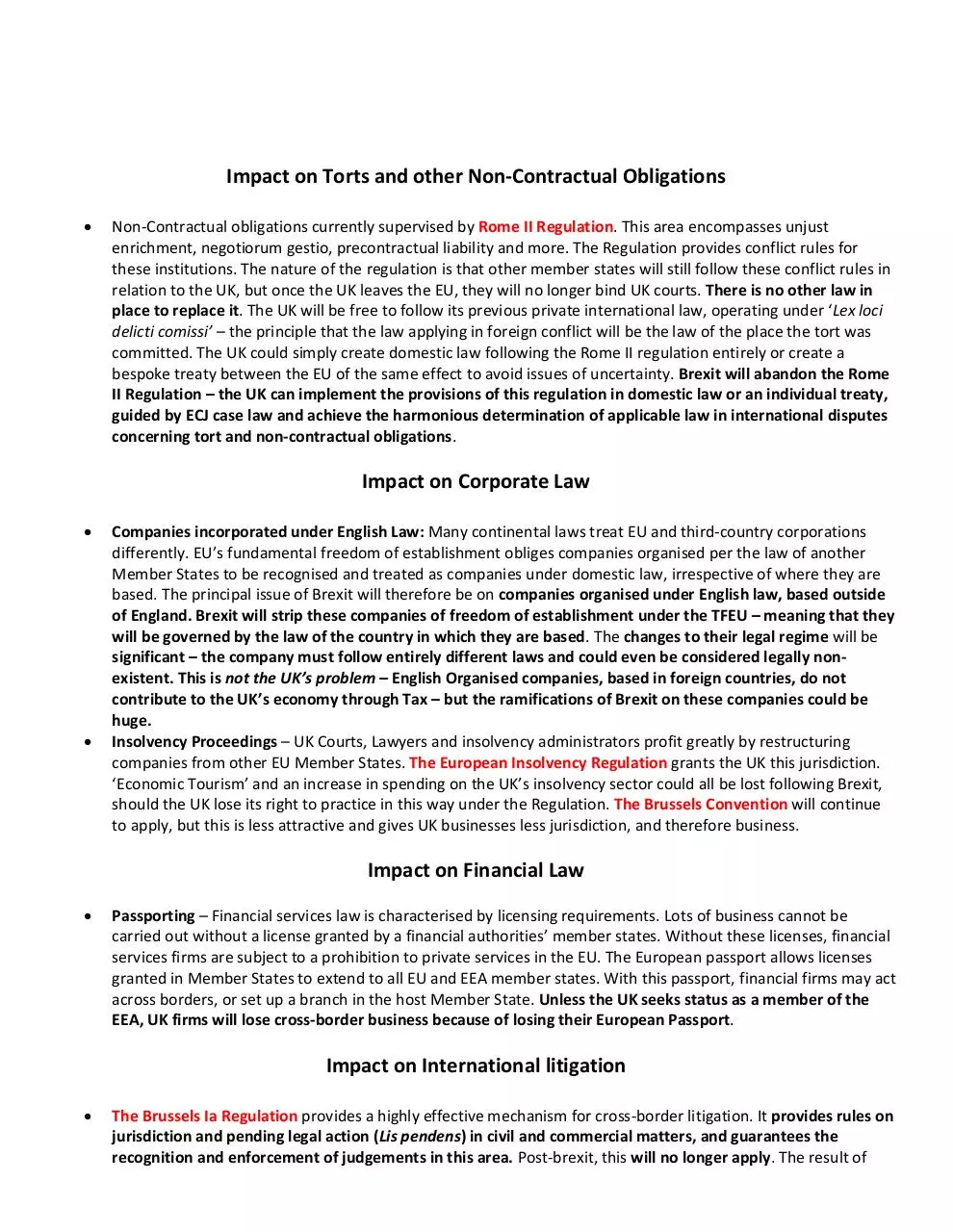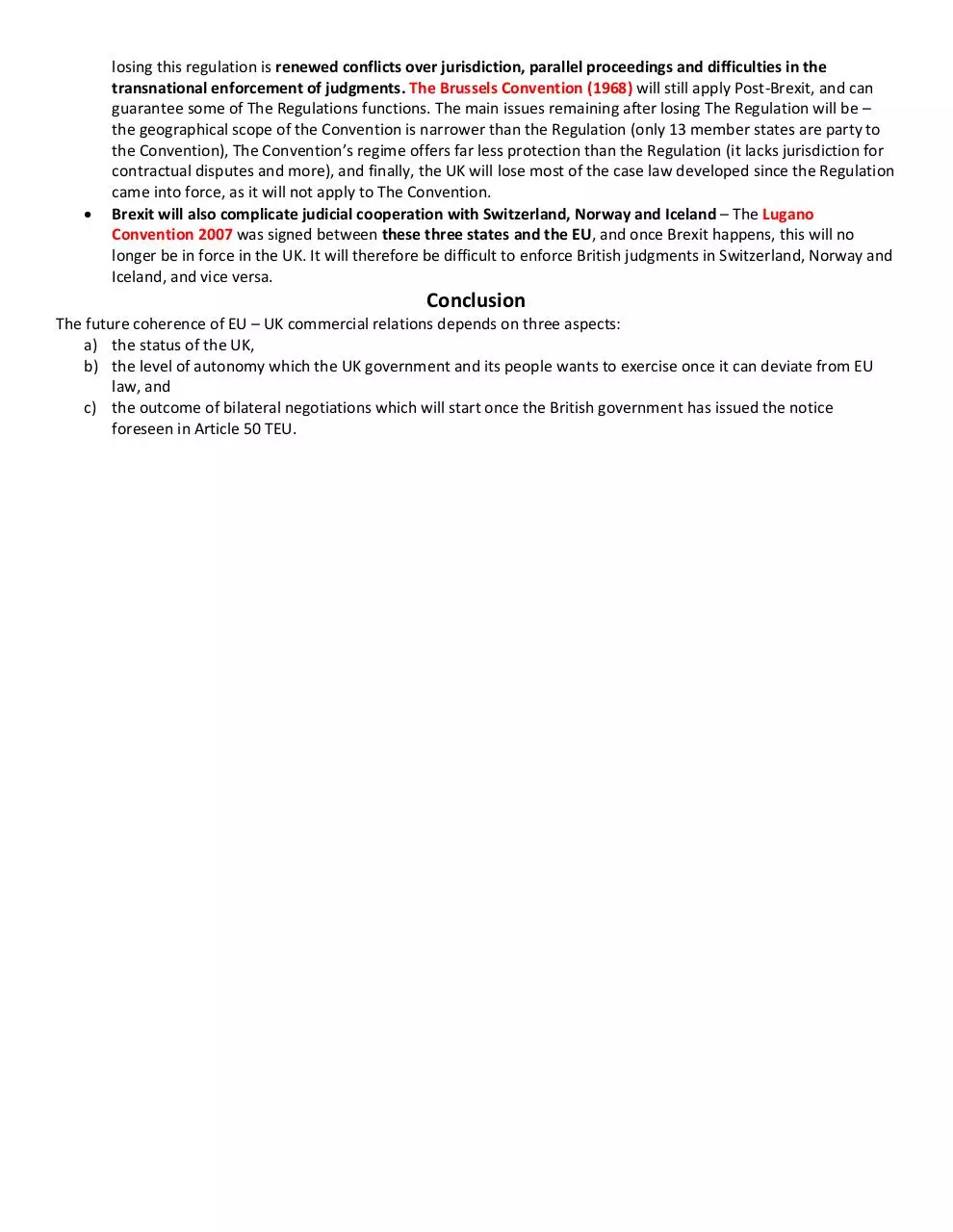The Consequences of Brexit on UK business (PDF)
File information
Author: Rory Partridge
This PDF 1.5 document has been generated by Microsoft® Word 2016, and has been sent on pdf-archive.com on 13/11/2016 at 15:22, from IP address 151.224.x.x.
The current document download page has been viewed 420 times.
File size: 632.29 KB (3 pages).
Privacy: public file



File preview
The Consequences of Brexit on UK business
This is a brief abstract of ‘Brexit and the Consequences for Commercial and Financial Relations between the EU and the
UK’
(https://poseidon01.ssrn.com/delivery.php?ID=3701150270920101181240950210650850941030330310410270100220
250050960921260261131230670570300390610081160260270901130300651120930490740030410850231251140730
74028071004083020026116030107071094075103075115026096019107076010092091107094020026068105086020&
EXT=pdf) . The article examines the most dramatic changes to UK businesses in the contexts of the different terms of
withdrawal agreement reached once article 50 is triggered.
The four most likely outcomes of Brexit are as follows;
1. The UK joins the European Economic Area – allowing the UK to negotiate its own trade deals with other
countries, whilst the four fundamental freedoms (goods, services, persons and capital) continue to apply to the
UK. The UK would gain unfettered access to the Internal Mark, but would be bound by some EU legislation. The
UK could join the EEA under special conditions, striving to be an ‘EEA minus’ state – this would alleviate
concerns about migration. Lichtenstein is an EEA state which has an upper limit of migration of 1.75%, so this is
not unheard of.
2. The UK negotiates a bilateral free trade agreement with the EU – This would be like the Swiss model or the
Canadian CETA Agreement. UK financial services would have to full comply with EU rules for this to work.
3. Third Country-Status – The UK and EU may not immediately reach any agreement on their future commercial
relations post-Brexit. If this is the case, the UK would have the same status as any third country (Third country –
country outside the EU) in relation to the EU, and so would the EU member states in relation to the UK. Imports
and Exports would fall under WTO (World Trade Organisation) law, namely GATT (General Agreement on Tariffs
and Trade) and GATS (General Agreement on Trade in Services). Because the UK was a member of the EC at the
time GATS was concluded, no specific GATS commitments exist between the UK and EU member states. These
would therefore have to be negotiated. Even if this is the case, British Firms would be subject to EU rules when
trading within the EU, and this could amount to full compliance with EU law.
4. A Bespoke Relationship – Theresa May has made it clear that she wants to depart from previous models. The
need for the EU and the UK to maintain mutually beneficial trading relations could inspire negotiations in the
direction of a tailor-made compromise. This will still fall under one of the three categories – EEA, bilateral
agreement, or no agreement at all.
Impact on Contract Law
Losing the UKs status as an EU member state could impact on existing contracts in two ways – by changing the
selection of applicable law or having consequence on the level of substantive contract law.
Conflict of law: Brexit will seriously affect the legal certainty of contractual relations. Courts determine the law
applicable to contracts through the Rome I Regulation. This regulation was created to harmonise conflict rules
for contracts. Post-Brexit, this will cease to apply in British courts. There is however, the Rome Convention
which has very similar content, and it is uncertain whether this will be relevant post Brexit. The Convention does
apply outside of the EU, but it may have been terminated once the Regulation was created. Insurance contracts
are not mentioned at all in the Rome Convention, so losing the Regulation would have a substantial effect on
the insurance market.
Substantive Contract Law: The fact that the UK is no longer an EU member state could be sufficient ground to
terminate a contract. This would be under the doctrine of frustration – where a supervening event either
renders the performance of an obligation impossible or deprives it of all interest to both parties. These
contracts could be saved by force-majeure clauses, but this depends on their precise wording. Brexit will force
businesses with international agreements to reconsider the validity of international contracts – particularly
smaller businesses with less resources.
Impact on Torts and other Non-Contractual Obligations
Non-Contractual obligations currently supervised by Rome II Regulation. This area encompasses unjust
enrichment, negotiorum gestio, precontractual liability and more. The Regulation provides conflict rules for
these institutions. The nature of the regulation is that other member states will still follow these conflict rules in
relation to the UK, but once the UK leaves the EU, they will no longer bind UK courts. There is no other law in
place to replace it. The UK will be free to follow its previous private international law, operating under ‘Lex loci
delicti comissi’ – the principle that the law applying in foreign conflict will be the law of the place the tort was
committed. The UK could simply create domestic law following the Rome II regulation entirely or create a
bespoke treaty between the EU of the same effect to avoid issues of uncertainty. Brexit will abandon the Rome
II Regulation – the UK can implement the provisions of this regulation in domestic law or an individual treaty,
guided by ECJ case law and achieve the harmonious determination of applicable law in international disputes
concerning tort and non-contractual obligations.
Impact on Corporate Law
Companies incorporated under English Law: Many continental laws treat EU and third-country corporations
differently. EU’s fundamental freedom of establishment obliges companies organised per the law of another
Member States to be recognised and treated as companies under domestic law, irrespective of where they are
based. The principal issue of Brexit will therefore be on companies organised under English law, based outside
of England. Brexit will strip these companies of freedom of establishment under the TFEU – meaning that they
will be governed by the law of the country in which they are based. The changes to their legal regime will be
significant – the company must follow entirely different laws and could even be considered legally nonexistent. This is not the UK’s problem – English Organised companies, based in foreign countries, do not
contribute to the UK’s economy through Tax – but the ramifications of Brexit on these companies could be
huge.
Insolvency Proceedings – UK Courts, Lawyers and insolvency administrators profit greatly by restructuring
companies from other EU Member States. The European Insolvency Regulation grants the UK this jurisdiction.
‘Economic Tourism’ and an increase in spending on the UK’s insolvency sector could all be lost following Brexit,
should the UK lose its right to practice in this way under the Regulation. The Brussels Convention will continue
to apply, but this is less attractive and gives UK businesses less jurisdiction, and therefore business.
Impact on Financial Law
Passporting – Financial services law is characterised by licensing requirements. Lots of business cannot be
carried out without a license granted by a financial authorities’ member states. Without these licenses, financial
services firms are subject to a prohibition to private services in the EU. The European passport allows licenses
granted in Member States to extend to all EU and EEA member states. With this passport, financial firms may act
across borders, or set up a branch in the host Member State. Unless the UK seeks status as a member of the
EEA, UK firms will lose cross-border business because of losing their European Passport.
Impact on International litigation
The Brussels Ia Regulation provides a highly effective mechanism for cross-border litigation. It provides rules on
jurisdiction and pending legal action (Lis pendens) in civil and commercial matters, and guarantees the
recognition and enforcement of judgements in this area. Post-brexit, this will no longer apply. The result of
losing this regulation is renewed conflicts over jurisdiction, parallel proceedings and difficulties in the
transnational enforcement of judgments. The Brussels Convention (1968) will still apply Post-Brexit, and can
guarantee some of The Regulations functions. The main issues remaining after losing The Regulation will be –
the geographical scope of the Convention is narrower than the Regulation (only 13 member states are party to
the Convention), The Convention’s regime offers far less protection than the Regulation (it lacks jurisdiction for
contractual disputes and more), and finally, the UK will lose most of the case law developed since the Regulation
came into force, as it will not apply to The Convention.
Brexit will also complicate judicial cooperation with Switzerland, Norway and Iceland – The Lugano
Convention 2007 was signed between these three states and the EU, and once Brexit happens, this will no
longer be in force in the UK. It will therefore be difficult to enforce British judgments in Switzerland, Norway and
Iceland, and vice versa.
Conclusion
The future coherence of EU – UK commercial relations depends on three aspects:
a) the status of the UK,
b) the level of autonomy which the UK government and its people wants to exercise once it can deviate from EU
law, and
c) the outcome of bilateral negotiations which will start once the British government has issued the notice
foreseen in Article 50 TEU.
Download The Consequences of Brexit on UK business
The Consequences of Brexit on UK business.pdf (PDF, 632.29 KB)
Download PDF
Share this file on social networks
Link to this page
Permanent link
Use the permanent link to the download page to share your document on Facebook, Twitter, LinkedIn, or directly with a contact by e-Mail, Messenger, Whatsapp, Line..
Short link
Use the short link to share your document on Twitter or by text message (SMS)
HTML Code
Copy the following HTML code to share your document on a Website or Blog
QR Code to this page

This file has been shared publicly by a user of PDF Archive.
Document ID: 0000506567.